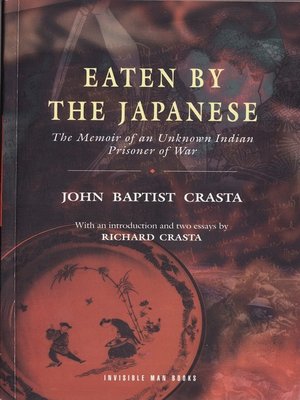Eaten by the Japanese
ebook ∣ The Memoir of an Unknown Indian Prisoner of War
By John Baptist Crasta

Sign up to save your library
With an OverDrive account, you can save your favorite libraries for at-a-glance information about availability. Find out more about OverDrive accounts.
Find this title in Libby, the library reading app by OverDrive.



Search for a digital library with this title
Title found at these libraries:
| Library Name | Distance |
|---|---|
| Loading... |
"Eaten by the Japanese" is the inspiring story of John Baptist Crasta, an Indian soldier in the British Indian Army, who miraculously survives 3 1/2 years of inhuman imprisonment and bombardment during World War II. Rescued by Australians, he returns home to India and writes this memoir in 1946. He then waits another 51 years before it is read and published by his son, who by then is an author living in the United States. In the process of reading and publishing the book, the son rediscovers his father.
To begin with one of the rave reviews: "What emerges in Crasta's survivor's tale is not a mere story of self but an epic of collective agony. This is the story, then, of a nation's agony as well as a man's, a man's survival as well as that of a nation's, in both cases to await the next chapter in a complex narrative."
The story begins in Singapore, where John Baptist Crasta was posted, and the British commander surrenders unconditionally to the invading Japanese. Rather than switch sides simply to save his own life, he chooses to suffer through 3.5 years of horrific imprisonment, including a journey in the Torture Ship to Torture Island.
This shocking and poignant story of World War II and its forgotten Indian Prisoners of War has never been told before from the viewpoint of an ordinary Indian soldier who was there, as one of its actor-victims.
"A classic in military history, telling the story of men trapped in a world of torture, starvation, and death"—Roger Mansell, War historian, in Tameme Magazine
"You see the horror of war, without a trace of artifice, through the eyes of one who was there, the writing a simple act of catharsis. A war memoir that ranks with the best."—Professor Mark Ledbetter, Nisei University
This 32,000-word book made Professor Barry Fruchter write: "Striking and raw, an antidote to myth. Something to be treasured. This is the kind of record that this generation is losing fast, and we need to hold on to this. It made me think of what had happened to my own father's memoirs, which were lost."







